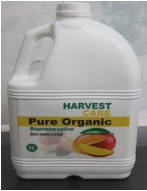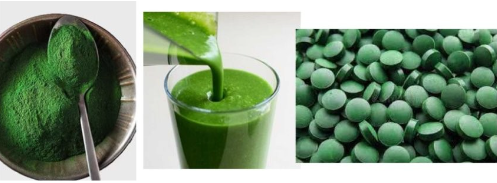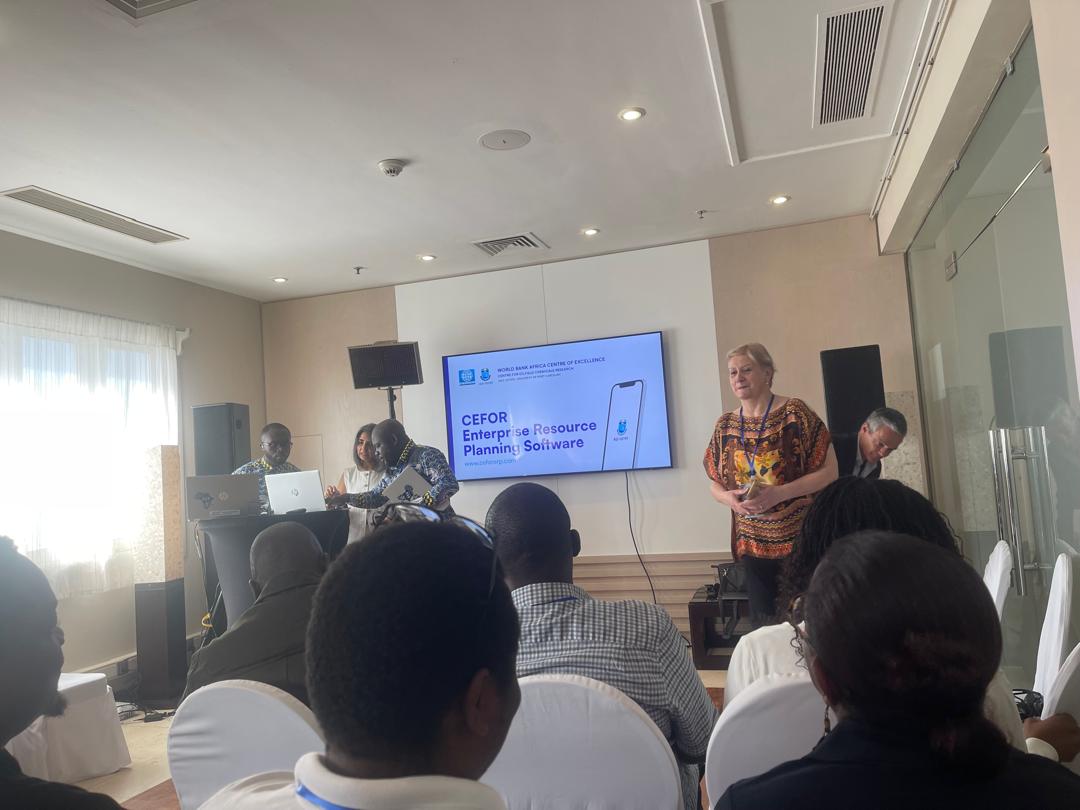In a landmark event aimed at showcasing the transformative potential of academic research and innovations by the Africa Centres of Excellence (ACE) and promoting the forging of partnerships between stakeholders from Africa and other continents, the ACE Programme hosted its maiden Partnership Workshop in May 2024 in Mauritius.
The dynamic Pitching Session, a key highlight of the workshop, presented groundbreaking innovations developed by the ACEs. The session for the presentation of these innovative projects that address critical societal challenges, was facilitated by Dr. Danica Ramljak, a Senior Science and Innovation Consultant at the World Bank, and her team of experts. The World Bank’s presence, represented by Dr. Namrata Tognatta, Senior Education Specialist and ACE Impact Task Team Lead underscored the importance of these projects and the investment opportunities they offer.
The innovations presented by the Africa Centres of Excellence during the session are not only scientifically robust but also commercially viable. They address pressing global challenges and offer substantial investment opportunities for stakeholders in the private sector. Investors are invited to collaborate with these centres to bring these game-changing innovations to market and contribute to societal advancement while reaping substantial financial returns. These commercialisable innovations serve as a powerful testament to the impact of academic research and its potential to drive economic and social transformation across Africa.
Overall, 13 innovative projects were showcased during the session, highlighting the impressive range of solutions developed by teams of renowned subject-matter experts from the centres. Though only a selection of projects was presented due to time constraints, the centres have many more outstanding projects to share with interested parties and collaborators. A brief highlight of each presentation is provided below:
- CEFOR Enterprise Resource Planning Software – an innovation by the Africa Centre for Oilfield Chemicals Research (ACE-CEFOR), University of Port Harcourt, Nigeria.One of the standout presentations was by the Centre for Oilfield Chemicals Research (ACE-CEFOR) from the University of Port Harcourt. The team, represented by its Centre Leader and its ICT Head, Mr. Daniel Okone, showcased their Enterprise Resource Planning (ERP) software. The university, known for its entrepreneurial spirit and robust intellectual property and technology transfer, has developed this ERP software to revolutionize resource management and organizational administration. The software offers a comprehensive Enterprise Resource Planning solution with multiple modules including E-Administration, E-Projects, E-Monitoring and Evaluation, E-Call for Proposals, E-Procurement, E-Assets/Inventory, E-Accounting/E-Auditing, and Cybersecurity. It addresses the problem of manual repetitive tasks, low productivity, and high organisational costs. Its all-in-one nature and competitive advantages make it attractive for diverse sectors and stakeholders, including governments, universities, non-profits, corporate organisations, and donor-funded/funding organisations.
- ToxoRap Test Kit (a molecular diagnostic kit) – invented by the African Centre of Excellence for Neglected Tropical Diseases and Forensic Biotechnology (ACENTDFB), Ahmadu Bello University, Nigeria
Another significant innovation unveiled to participants at the pitching session was a molecular diagnostic kit designed for detecting and genotyping Toxoplasma Gondii, the parasite responsible for toxoplasmosis. Toxoplasmosis is a water and food-borne zoonotic disease of public health concern with one-third global prevalence (Almeria and Dubey, 2021). Infection of pregnant women and children, especially those who are congenitally infected (infected in the womb), can lead to serious health issues and, in some cases, death. Treatment and effective management of toxoplasmosis is hinged on early detection and accurate diagnosis. The ToxoRap Kit provides results within 4.5 hours, significantly faster than current market solutions, which require 20 -36 hours for diagnostic results to be ready. Additionally, it fills the gap of the current unavailability of a singular diagnostic tool that combines both detection and genotyping, which are needed to foster effective treatment procedures.
The presentation indicated that the ToxoRap Kit is clinically suitable, sensitive for early diagnosis of toxoplasmosis to the genotypic level and comes with an illustration of the working steps and principle involved in the diagnostic tool, that is, the procedure for collection of samples (blood, fluid, fecal or tissue) from suspected infected person or animal or environment. The ToxoRap Test Kit has been proven to detect and genotype T. gondii at low infection density and different stages (life cycle) of the parasite, which is not the case for the test kits currently available on the market.
- Production and Commercialization of Ghee-based Products – by the Pharm-Biotechnology and Traditional Medicine Centre (PHARBIOTRAC), Mbarara University of Science and Technology, MUST, Uganda.
This innovative project seeks to upscale industrial-grade ghee production in Western Uganda in partnership with farmers and establish efficient marketing and distribution systems for the purified ghee and various ghee-based products. Its vision is to convert local resources into high-quality industrial grade raw materials and world-class products. Currently, 70% – 80% of materials are imported for cosmetic and drug production at a commercial level, even though only 1.1 million of the 8.8 million liters of milk produced in Uganda are consumed. Cow ghee has proven to be excellent for topical drug delivery. So far, products generated from the Purified-Ghee have met industrial-grade specifications, with promising end-user feedback, therefore upscaling production of the industrial-grade ghee and related products will contribute to import substitution and boost farmers’ household income. A competitive landscape analysis revealed that the Ghee-based products meet a lot more parameters than other products on the market, which are petroleum-based and gel-based. These included antioxidant, anti-aging, and skin cleansing activity. It is also 100% natural and compatible with the human body, has moisturizing effects, and remains stable in aqueous product formulations.
- Development and Evaluation of Rapid Test Kit for Detection of Respiratory Infections by the Africa Centre of Excellence in Materials, Product Development and Nanotechnology (MAPRONANO), Makerere University, Uganda.
Respiratory infections, such as pneumonia, are a leading cause of hospitalization and mortality among children and the elderly in Uganda and other developing countries. The Centre’s mission is to be a regional leader in the development of low-cost Point-of-Care (POC) Testing devices for respiratory infections. This innovation introduces the added value of a low-cost test kit to the market, as the currently available methods are quite expensive. The team envisions producing test devices that will cost less than 1 USD (each), hence cheaper to use in resource-limited settings. Generally, the team is working on other projects/products, including Covid-19 antibody RDT, RDT for detecting pneumonia-causing pathogens, and RDT for SARS-CoV-2 detection.
- Harvest Care (helps to extend the shelf life of farm produce)– Innovation by the Centre of Excellence in Phytochemicals, Textile and Renewable Energy, Moi University, Kenya.

A total of 1,024,500 metric tons of mangoes are produced annually in Kenya (HCD, 2021); however, losses in quality and quantity occur during the production, postharvest, and processing as well as the supply chain at an estimated 40%–50% of the total output. This loss has dramatically worsened Kenya’s food insecurity and attainment of SDG 2. Harvest Care is, therefore, an innovative product by the Centre of Excellence, which comes in strongly to reduce these food losses. It is a pure organic liquid product that extends the shelf life of Mangoes, for more than 3 weeks, and can help to greatly reduce financial losses. Its unique value proposition includes the fact that it is cost-effective as local raw materials are used in its production, it presents no health concerns due to its usage of bio-preservatives. Harvest Care is eco-friendly and requires no electricity in its application. By way of scaling up, other market segments, aside from the mango market, that are targeted include other fruit produce, such as tomatoes, pawpaws, oranges, apples, and avocadoes. - Chiweto – (Delivering Inclusive Digital Solutions for Farmers) – An invention by the Centre of Excellence in Transformative Agriculture Commercialisation and Entrepreneurship, Lilongwe University of Agriculture and Natural Resources, Malawi
This innovation directly responds to the problem of poor veterinary services offered to farmers, where the current statistics reveal 1:14,139 veterinarian to farmers’ ratio. There is also lack of information and limited skills to access information, where farmers cannot directly access needed information for their work. This causes losses in, for instance, the cattle rearing market, where the smallholder dairy industry in Malawi, loses up to $300,000 daily to low mild yield (10/cow/d). Its competitive advantage over other solutions on the market relates to its real-time nature and the interactive functions of the solution. It is also a bundled digital service and can easily be accessed on one’s phone. In addition to offering veterinary information and services to cattle farmers, it has an insurance component that aims at insuring 50,000 cattle in its target countries by 2027.
- LAAFI Monitor – by the International Institute for Water and Environmental Engineering (2iE), Ouagadougou, Burkina Faso
This innovation is based on the LAAFI CONCEPT, which focuses on the management and intelligence of the cold chain for emergency products that are extremely sensitive to heat. One key sector that uses this monitor is the health sector – especially its immunization processes and others. Another is the agricultural sector, as it records at least 58% of food losses (WFP, 2021). The monitor captures temperature, humidity levels, has an onboard memory of up to 1 year of data recording and presents a swappable battery. Other products generated by the Centre along these lines include the Laafi Bag (produced in 2018), which serves as an active cooling backpack for pharmaceuticals. The Laafi Monitor, produced in 2021, is also a monitoring device for pharmaceuticals. The target clients for the products are typically ministries of health, laboratories, UN agencies, ministries of agriculture, private companies, pharmacies, and others. So far, these LAAFI concepts have been trusted by the Ministry of Health in Burkina FASO, the African Development Bank, and the UNDP’s Accelerator Labs.
- Green AI SUCE (AI-Based Agricultural Supply Chain E-Commerce Application) – by OAK-PARK, ICT-Driven Knowledge Park (OAK-PARK) at the Obafemi Awolowo University, Nigeria
This innovation seeks to respond to the problem of wastage that the agricultural sector faces due to the untimely delivery of farm produce directly to consumers, among others. The supply chain e-commerce application developed by the OAK-PARK team of experts seeks to be the most extensive AI-based smart agricultural supply chain solution in Africa worth $5.01billion profitability with increased 50% GDP. Its offers and solutions are countless, including expanding production, market access, providing real-time monitoring, offering profit maximization strategies, providing data-driven insights, streamlining the supply chain, providing intelligent logistics, and securing financial transactions.
The application allows farmers to upload available products and request warehousing and logistics services and financial aid. Farmers can rent farm machinery and purchase farm inputs among a host of other supply chain requirements. The Green AI-SUCE is designed to respond to farmers’ various requirements. It offers key competitive advantages, such as a digital wallet, being accessible via a mobile phone, offering real-time delivery monitoring and being readily available in Nigeria. OAK-PARK invites stakeholders and investors to join the team in revolutionizing agriculture in Africa.
- Modified Zinc Oxide Nanoparticles (ZnO NPs) for Termites Control – Africa Centre for Food Technology and Research (CEFTER), Benue State University, Makurdi, Nigeria
This project presents a cost-effective and environmentally friendly solution for termite control using modified Zinc Oxide Nanoparticles. It presents a solution in response to the devastating ability of termites to inflict structural damage, which poses a significant threat to both urban environments and agricultural landscapes, leading to crop destruction in some cases. To avert termites triggered food shortages and post-harvest food losses, there are various chemical pesticides and insecticides on the market. However, concerns are raised about the environmental impact of such products and their effect on human health. As a response, the project team from the centre modified Zinc Oxide Nanoparticles of different concentrations, with a powerful effect on termite, addressing the limitations of traditional termite control methods. This product is harmless to agricultural produce and humans, as they serve as part of the composition of some human body creams. Additionally, the cost-effectiveness of this product makes it a true game changer in the industry.
- Antimicrobial Nano-reinforced Bacterial Cellulose Hydrogel (BCH) from Agro-residues: Production and Application in Wound Healing, ACENTDFB, ABU, Zaria, Nigeria
ACENTDFB has developed a technology for producing high-yield and quality BCH from agro-wastes, which is applicable in treating burns, diabetic foot ulcers, and other conditions. This innovation utilizes genetic engineering and process optimization to obtain high-quality BCH. There is an increasing demand for BCH as pharmaceutical raw material, and ACENTDFB has the technology to respond to this demand. The invention utilised genetic engineering and process optimization to develop a technique for obtaining high yields of BCH from locally isolated microorganisms grown on agro wastes.
- Harnessing the Power of Microalgae to Tackle Malnutrition Sustainably – Presented by the Africa Centre of Excellence in Food and Nutrition Security (CREATES-FNS), the Nelson Mandela African Institute of Science and Technology, Arusha, Tanzania

This initiative targets providing nutrient-dense microalgae-based products that are environmentally friendly, sustainable, and cost-effective, and it has the vision of revolutionizing nutrition using sustainable microalgae-based solutions. GAIN, 2024 posits that one in three people worldwide suffers from one or multiple forms of malnutrition, and the Food and Agriculture Organisation (FAO) indicates that 795 million people do not get the food they need to live healthy lives. The implications of Malnutrition are dire, as, among others, it contributes to increased mortality rates, reduced productivity and inhibited cognitive and physical development, particularly in children.The solution introduced by CREATES-FNS ranges from the microalgae powder itself to different formulations that emerge from the innovations undertaken by the team. The solution is unique because it uses environmentally friendly, highly productive, and cost-effective microalgae cultivation technology. The centre’s production methodology also increases productivity by 25 times, lowers production costs by more than 50%, and reduces land use by 200 times compared to traditional pond systems, which competitors largely depend on. This invention is backed by science, continuous research and innovation, thereby ensuring sustainability in producing diverse bioactive nutrients.
- Production of Cement Using Natural Pozzolanic Material, Water Infrastructure and Sustainable Energy Futures (WISE-Futures) Centre, The Nelson Mandela African Institution of Science and Technology (NM-AIST), Arusha, Tanzania
This project introduces the value of producing high-quality cement for construction projects, at affordable prices while promoting an eco-friendly environment. The current challenge in the construction venture is that the available ordinary Portland cement emits high levels of carbon dioxide (CO2), thereby contributing to environmental pollution. Its energy consumption is also high and its cementing materials have less strength and durability.
WISE-Futures has, therefore, developed an innovative production process for cement that leverages natural pozzolanic material. This product increases the strength of the cementing material by more than 53% and reduces energy consumption and cost by 45% and 12% respectively. Its CO2 emissions are also reduced by at least 9%. Among others, this product can be used to construct short and high-rise buildings, bridges and dams, highways and railways, blocks and paving, and pre-cast concrete production.
- Strengthening Ghana’s Tomato Industry – Presented by the West Africa Centre for Crop Improvement (WACCI), University of Ghana, Ghana

This project’s vision is to establish Ghana as a self-sufficient tomato-producing nation by 2025. It targets empowering local farmers with innovative techniques and high-yielding varieties, enhancing food security and nutrition through increased local tomato production, offering profitable opportunities for farmers with high-yielding tomato varieties, reducing dependency on costly tomato imports, and fostering economic growth of the country. There is a vast tomato supply gap in Ghana, where demand for tomatoes surpasses local production capacity. The challenges include poor yield per hectare and the limited availability of high-quality seeds and farming practices. The national proposed strategy is to increase local tomato production by 314,000 Metric Tons within three years and introduce high-yielding tomato varieties. WACCI has, therefore, intervened through its introduction (and production) of certified high-yielding (50 MT/ha) tomato seeds to the Ghanaian market. Its facilitation of on-farm trials and demonstration plots, as well as training programmes for youth and farmers in Good Agricultural Practices (GAP), are game changers.
The significant gap between demand and supply presents a lucrative opportunity for growth and investments. The current estimated fresh tomato requirement for self-sufficiency in Ghana is 1.8 – 2.2 million metric tons, while the local production stands at 510,000 metric tons only. WACCI is therefore calling on investors and collaborators to join the team in empowering farmers and securing Ghana’s tomato future.
The Call to Investors and Interested Parties
Investors and interested parties with aligned visions and seeking to collaborate with the Africa Centres of Excellence to commercialise these innovations or engage with the centres on these inventions are invited to contact the ACE Programme’s Regional Facilitation Units – The Association of African Universities (AAU) and the Inter-University Council for East Africa, via the indicated Programme Managers:
- Dr. Sylvia Mkandawire – smkandawire@aau.org
- Prof. Meshack Obonyo – mobonyo@iucea.org
